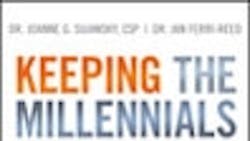Keeping the Millennials
The children of Baby Boomers are beginning to flood into global job markets. Born between 1980 and 1999, these new employees are shaking up the workplace. They're called the Millennials (or Generation Y) and their impact on businesses and organizations around the globe is going to be profound.
Over the next two decades the cost to recruit and train Millennial employees will be huge. And, if organizations don't take positive steps to fully integrate younger workers, the resultant turnover -- which costs from 50% to 150% of an employee's salary -- could run into the billions. That's a real challenge these days because the Millennials bring with them a unique perspective (and work ethic) that stymies older workers and frequently leads to intergenerational conflict.
Managing Across the Generational Divides
Fortunately, companies can create a culture that attracts and retains multiple generations or employees. Not that managing a multi-generational workforce is simple. The Mature or Silent generation, born before 1945, displays a loyalty to the company that places duty before pleasure. Baby Boomers, born between 1946 and 1964, are known for being workaholics, for maintaining a love-hate relationship with authority and for being extraordinarily idealistic and optimistic. Gen Xers, the MTV generation, came into the world between 1965 and 1979. They often demonstrate independence, are results oriented and are known for their skepticism.
Creating a culture that integrates and energizes Millennial employees with those of other generations means challenging them, providing plenty of feedback, cross-training to build competencies, and developing clear-cut career paths. Ironically, these are effective management strategies that also work well with Boomers and Gen Xers (although they may not be as likely to bail out if these conditions aren't met.)
While there have been many books published about the upcoming Millennial generation, many have been somewhat disparaging of Generation Y. Older employees seem fond of complaining about the Millennials "laziness," disrespect for authority, poor work ethic and sense of entitlement. In contrast, there needs to be a strong advocate for these new workers.
True, the Millennials have grown up with more feedback and praise than previous generations, but that also translates to higher expectations for success.
Millennials are technologically savvy multi-taskers who work best when collaborating. They're energetic and enthusiastic and potentially bring a new sense of energy to the workplace. Companies looking to attract and retain Millennials are finding ways to make their work culture more enjoyable and dynamic.
When you take the effort to create a fun atmosphere you not only attract Millennials, you also unleash their naturally high energy levels. Think of the Millennials' mantra as "work hard, play hard."
Practical Advice and Strategies
In order to build a Millennial-friendly workplace, companies need to determine what Millennials find "cool" in prospective employers and how organizations can cultivate that image. Some practical ideas include:
- Career laddering. Show prospective employers what their career progression can look like. Employees get to know what behaviors they need for each position within a company and what they need to advance themselves.
- Socialization. Create an extended new employee orientation process called onboarding to help new hires to get more ingrained in the company. It's where they will begin to establish and develop their social and professional network within the company.
- Mentoring. Mentors are a proven way to cultivate the careers of promising proteges through one-on-one interaction.
- Positive reinforcement. If you want to see positive behaviors being repeated on the job, then you have to use positive reinforcement with your employees. The more structured you make the feedback, the more effective it is in producing the repeated behaviors that you find desirable.
The future success of the Millennials will be dependent upon how they are groomed for leadership today. They will need to be well prepared for those responsibilities and it will be equally important to help them maintain a sense of optimism as they face tougher times ahead.
Businesses can no longer afford to pay lip service to recruiting Millennials, only to end up alienating the very employees they've spent so much time and money hiring and training. Like it or not, the rising Millennial generation is going to challenge the status quo, rewrite the rules and revolutionize the workplace.
Only those managers who are armed with the right tools will be ready to harness the Millennial generation's talents and transform their organization's culture into a more dynamic, energetic and productive workplace, ready to face the challenges ahead. In these demanding times what more could leaders hope to achieve?
Dr. Joanne G. Sujansky is CEO of the KEYGroup, an international speaking, training, executive coaching and assessment firm. Dr. Jan. Ferri-Reed is President of the KEYGroup. www.keygroupconsulting.com
